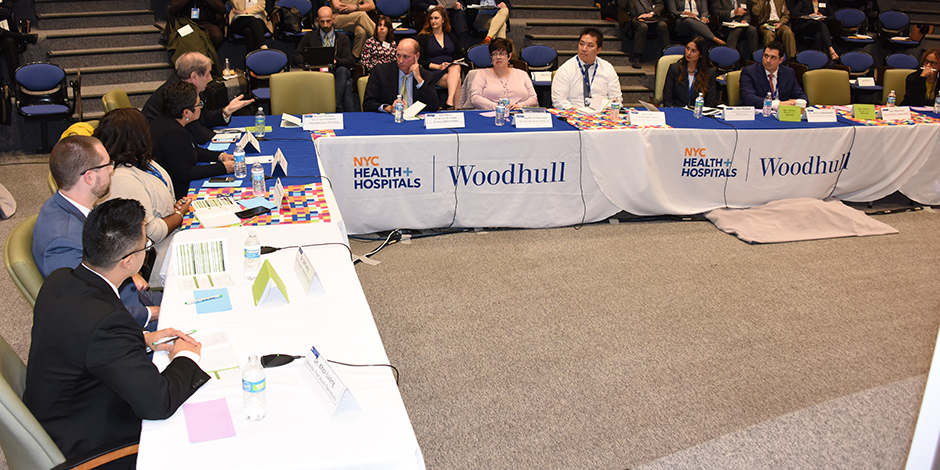More than 100 Mobilize for Pandemic Response Workshop Hosted by NYC Health + Hospitals
Nov 20, 2018

To gain a perspective on the most advanced, optimal response systems for their respective providers, more than 100 health care executives gathered for a pandemic response workshop on November 1 at NYC Health + Hospitals/Woodhull.

Leading the workshop from NYC Health + Hospitals were, from left, Syra Madad, DHSc, MSc, MCP, Senior Director, System-wide Special Pathogens Program, and Nicholas V. Cagliuso, Sr., PhD, MPH, Senior Assistant Vice President for Emergency Management.
“The increasing prevalence of infectious disease epidemics worldwide constitutes the need for a well-prepared response system” said Syra Madad, DHSc, senior director of NYC Health + Hospitals system-wide Special Pathogens Program.
Hosted by NYC Health + Hospitals Emergency Management’s Special Pathogens Program—in collaboration with Johns Hopkins Center for Health Security at the Johns Hopkins Bloomberg School of Public Health—the workshop addressed high level strategic decisions that an integrated health care delivery system of acute, post-acute and ambulatory sites would pursue along with local, state, and national public health authorities and liaisons in order to prepare for and respond to the aftereffects of a highly pathogenic avian influenza pandemic.
“Being ready for the next pandemic will make a difference in saving lives under challenging circumstances,” said Kevin Yeskey, MD, principal deputy assistant secretary for preparedness and response at the U.S. Department of Health and Human Services who participated in the workshop. “Through our Hospital Preparedness Program, we have found discussions like this one to be valuable steps in preparing health care systems and their staffs to overcome the potential challenges.”
“The Centers for Disease Control and Prevention supports state and local governments in fighting seasonal influenza each year and preparing for the next influenza pandemic. Exercises like this one provide an important opportunity to explore activities and challenges involved with responding to one of the world’s greatest infectious disease challenges,” said Tim Uyeki, MD, MPH, MPP, Chief Medical Officer, Influenza Division, Centers for Disease Control and Prevention.
Lessons learned from a previous surge mystery patient drill conducted at NYC Health + Hospitals were presented to illustrate potential issues at hand when responding to an airborne, surge-type disease event. Current and prospective technologies and tools for pandemic preparedness and response were also discussed.
This year marks the 100th anniversary of the 1918 Influenza Pandemic, one of the most devastating infectious disease events in recorded history, infecting as many as 500 million people and killing nearly 1 out of 20 people worldwide.
“Substantial advances have been made in public health and health care infrastructure, particularly in vaccines, antibiotic drugs, sanitation infrastructure, intensive care capacity and medical technology,” added Dr. Madad. “Despite these developments, infectious diseases are not only spreading faster at an unprecedented rate around the globe, they also appear to be emerging more quickly and are becoming increasingly difficult to treat. Within just these past five years, the World Health Organization has verified more than 1,100 epidemic events worldwide. Indeed, the increasing prevalence of infectious disease epidemics worldwide makes the need for a well-prepared response system paramount.”